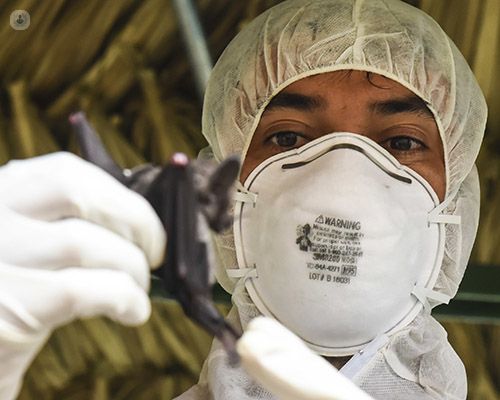

What are infectious diseases?
Infectious diseases are caused by pathogenic microorganisms which include viruses, bacteria, fungi and parasites, hence there are many different types. They can be spread from person to person or can be transmitted from animals (these are known as zoonotic diseases). They can also be transmitted by insect bites. You may also become infected from coming into contact with contaminated food or water.

Prognosis of infectious diseases:
Infectious diseases range in prognosis, with some responding well to homecare and rest, whilst others can become life-threatening and require hospitalisation. Some infectious diseases, including the chickenpox, can be prevented with vaccinations.
Symptoms of infectious diseases:
Although the symptoms vary between each infectious disease, common symptoms between them include:
- Fever
- Fatigue
- Diarrhoea
- Aches
- A cough
Medical tests to diagnose infectious diseases:
As many infectious diseases have very similar symptoms, tests will usually be needed to determine the exact cause. The following tests may be carried out:
- Urine tests
- Blood tests
- Stool sample
- Throat sample – a swab is taken from the throat to examine.
- Lumbar puncture – a sample of cerebrospinal fluid is taken from the spine.
- Biopsies
- Scans – x-rays, CT or MRI scans
What are the causes of infectious diseases?
Infectious diseases can be caused by:
- Bacteria – single-cell organisms that cause infections like urinary tract infections and tuberculosis.
- Fungi – often causing skin conditions, such as ringworm and athlete’s foot.
- Viruses – these cause a huge range of diseases, including the common cold, HIV/AIDS and the Ebola virus.
- Parasites – these may be transmitted through insect bites and include malaria and dengue fever.
Can infectious diseases be prevented?
The following measures are the best ways to avoid infectious diseases:
- Good hygiene – wash your hands before and after preparing or eating food and before and after the toilet.
- Getting vaccinated
- Ensure you cook food safely and store food properly as well.
- Have safe sex using condoms
- When travelling, make sure you have any recommended vaccinations and drink bottled water.
- Avoid contact with wild animals
- Don’t share items like toothbrushes, razors or drinks.
Treatments for infectious diseases:
Once the cause of an infectious disease has been determined, your doctor will begin treatment. The following will be used:
- Antibiotics – usually used for bacterial infections (e.g. pneumonia)
- Antivirals – used to treat viral infections (e.g. HIV/AIDS and the flu virus)
- Antifungals – usually these are topical or oral and can treat fungal infections
- Anti-parasitic medications – treat diseases caused by parasites (e.g. malaria)
Which type of specialist treats infectious diseases?
Specialists in internal medicine can treat infectious diseases, but some doctors specialise solely in the diagnosis and treatment of infectious diseases.
